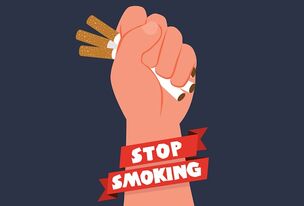The transition to a healthy lifestyle is not as easy as it might seem at first glance. The period of withdrawal or withdrawal, when the body completely rebuilds its work due to the lack of nicotine, can be very painful. This applies not only to changes in the psychoemotional state - increased anxiety, irritability, but also a deterioration in physical well-being: a cough appears, the work of the digestive system changes, and headaches torment. The listed symptoms are observed in almost all people with many years of smoking experience, so not everyone cope and bring what they started to the end.

How to quit smoking without harm to health and how to improve your well-being is important for those who have experienced withdrawal symptoms. To smooth out its manifestations, a smoker must follow a number of rules - following them will improve the physical and mental state and allow you to get out of addiction without unnecessary stress.
General rules for quitting smoking
To get the effect, follow these guidelines:
- Competently composed diet. It is known that after a heavy meal: fatty, fried, acute desire to smoke increases. However, these products must be excluded from the menu also because they create additional stress on the body. At the same time, you should consume herbal teas, fruit drinks, mineral water - a large amount of liquid will help accelerate the elimination of toxins. It is recommended to consume dairy products - milk changes the taste of cigarettes, smoking ceases to bring pleasure. However, you should drink natural unpasteurized milk, otherwise the required effect will not be achieved. It is advisable to drink a glass of warm drink every morning.
- It is also important to control your diet because people often “seize” the stress associated with smoking, and therefore gain a lot of weight. So that there is no fear of gaining weight, light, low-calorie products are recommended that will allow you to maintain your figure. For snacks, it is good to use not candy and cookies, but vegetables and fruits.
- Elimination of alcohol, strong coffee and tea. All these products, along with cigarettes, are characterized by a stimulating effect on the body. Tea and coffee increase anxiety levels and lead to sleep disturbances, and alcohol dulls self-control.
- Taking vitamins. Within 1-1. 5 months after quitting smoking, vitamin complexes should be taken. Especially during this period, it is recommended to take ascorbic acid.
- Use of nicotine-containing products. Patches, sprays, chewing gums, which contain nicotine in a small dosage, can smooth out the manifestations of withdrawal. Some people switch to electronic cigarettes - this is easier to quit, although the product is not harmless, so it cannot be recommended to use it.
- Breathing techniques. To calm down during an attack of irritability, it is recommended to use "belly breathing". The technique is safe and used in yoga, meditation, sports training. The relaxation effect is observed almost instantly. In addition, deep breathing improves the functioning of the digestive system and strengthens the lungs. During inhalation, the abdomen protrudes, and on exhalation, it is strongly pulled in with the tension of the abdominal muscles.
- Correct regimen and physical activity. During the period of giving up cigarettes, the body is exposed to great stress, so it is necessary to pay attention to the restoration of vitality. Full sleep and sports are required. Physical activity stimulates the production of serotonin, which helps to stabilize the emotional background.

Quit the habit abruptly or gradually
The opinion of psychologists is uncompromising: you need to quickly eliminate cigarettes from life. With a gradual refusal, the number of cigarettes is gradually reduced or products with a lower content of nicotine and tar are purchased. A person struggles with the urge to smoke, but still lights up cigarettes, so the body is in constant stress for a long time. The advantage of immediate abandonment is the immediate severing of the psychological and physical connection with the habit.
If you abruptly give up cigarettes, you need to hold out for the first 3-5 days - after this period, the body itself will begin to produce nicotine and physical well-being will improve. However, psychological discomfort can persist for a long time - in any emotionally unstable situation, there will be a desire to smoke.
It should be understood that after a few days without nicotine inhalation of tobacco smoke will lead to unpleasant sensations - dizziness, severe tachycardia. The body is cleansed and does not feel the need for a substance, but an old habit can take over. For many, these very feelings help to quit forever - it becomes clear that there is no pleasure, but some smoke several cigarettes in a row, returning back to addiction.

In some cases, phasing out is preferable. As a rule, this recommendation applies to people who have been smoking for more than 10 years. If blood pressure suddenly rises, convulsions appear, severe headaches are tormented, it is necessary to consult a doctor: the doctor, having studied the patient's condition, will be able to answer how best to quit smoking: abruptly or gradually, and prescribe medications that will help to cope with the manifestations of withdrawal syndrome. . .
For pregnant women and mothers of breastfed babies, quitting smoking abruptly is the only right decision.
Nicotine is dangerous in any trimester of pregnancy, you cannot feed your baby with milk, which contains toxins. Some women say that after quitting smoking, their breasts began to enlarge. Having noticed such changes, it is recommended to go to a mammologist just in case. As a rule, these two phenomena are not related, but hormonal changes are possible, and it is better not to abandon your condition, but to check. Female smokers need to be careful when using birth control pills. This combination leads to changes in blood characteristics.
Common mistakes and misconceptions
Anyone who has ever tried to quit smoking has faced the misconceptions cited in his book by the popular author A. Carr.
These errors sound like this:
- I will smoke less.
- Only 1 cigarette.
- I'll drag it on once.
Deleting all of these phrases once and for all is good advice to listen to.
By limiting yourself in this way, you make smoking a pleasure, a gift that you look forward to. The opposite effect is often observed: those who quit smoke even more.
There should be no exceptions called "only one cigarette" - this is a trap, from which one has to get out of it for years. When it comes to how long it takes to quit smoking, in most cases it takes as long as it takes to crumple and discard the pack. The potential likelihood of smoking lasts a lifetime - it all depends on the mood and motivation of the person.

Cigarettes should not be used as an assistant in the fight against stress, bad mood. They will not help you concentrate or calm down - for this purpose, breathing techniques can be used that will prove to be more effective and not harmful.
Don't think that something valuable and important is being taken away from you, making yourself a victim. Suffering is not appropriate here, but you can be proud of yourself, as even despite the difficulties, you return to a healthy lifestyle.
It is important to surround yourself with non-smokers, or at least avoid visiting smokers. Forming your environment is extremely important when a person wants to quit smoking marijuana - here it is impossible to get out of addiction without changing the social circle.
Conclusion
If you cannot completely quit smoking on your own at home, you should contact a narcologist. A non-smoker feels the taste of life more fully, breathes deeply in every sense of the word, so you should not continue to poison your body if you have already tuned in to health.























